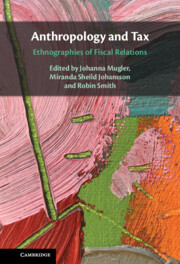‘Anthropology and tax? But of course! Fiscal questions are, after all, moral ones, and taxes are that peculiar and ancient form of payment stitching peoples to polities, remaking value, subjecthood, citizenship and state in the process. This compelling volume brings together contributions reflecting the crucial insights that deep, ethnographic work on tax relations can yield, including inquiry into the very nature of wealth, governance, recognition, rights, and redemption. With cases spanning the globe, it provides a fantastic starting point for anyone hoping to gain a richer understanding of the one constant in life-besides death-and the machinations of both states and their subjects to evade both death and taxes.’
Bill Maurer - Professor of Anthropology and Law, University of California
‘The complex and diverse practices of fiscal relations - as embodied in tax, taxpayers, and tax systems - are the substance of this superb volume. Across 14 compelling chapters, scholars provide ethnographical investigations of tax across multiple scales and across historical and geographical contexts. In the process, they contribute meaningfully both to a new anthropology of tax and the perhaps more important task of global tax justice.’
Gurminder K. Bhambra - Professor of Historical Sociology, Department of International Relations, University of Sussex
‘This book is timely in the face of global upheaval and the pressing need to disrupt entrenched and simplistic views of tax policy (what, who and how we tax) and tax compliance (who pays). Individually, the chapters are fascinating studies providing insights into a wide range of overlooked issues, each worthy of attention in its own right. Collectively, however, the book does much more in daring to question how we currently think about tax and opening up possibilities to think differently.’
Lynne Oats - Emeritus Professor of Taxation and Accounting, University of Exeter
‘For decades, anthropology has homed in more and more on the state and its capacities, intensively studying its immense power to create and nurture such things as borders, identities, and infrastructure. How strange, then, that far too many of us have shied away from ethnographic research into the central spigot - taxation - that fructifies all of this state growth and power. As this diverse collection of studies attests, it is a fascinating spigot indeed, crucially regulating the highly contested flow of value between citizen and state, while always navigating the uneasy tension between the public and the private. In so doing, the authors have provided us a well-researched, vital, and thought-provoking anchor for a nascent anthropology of taxation for years to come.’
Gustav Peebles - Associate Professor in Social Anthropology, Stockholm University
‘This book is a must-read for anthropologists and social scientists interested in taxation. The rich introduction is followed by ethnographic papers from around the world and opens up questions of fiscal matters, including ethics, justifications, compliance and resistance.’
Soumhya Venkatesan - Professor of Anthropology, University of Manchester


